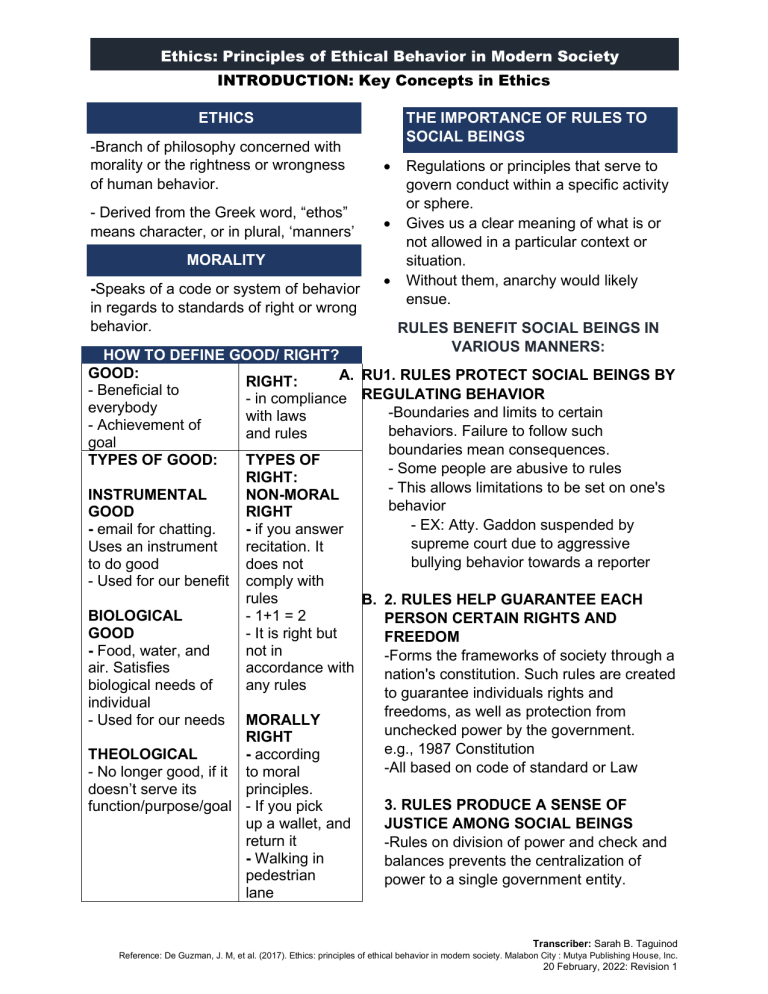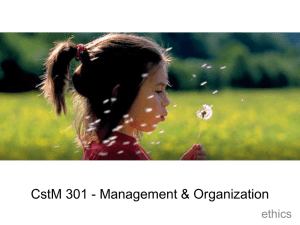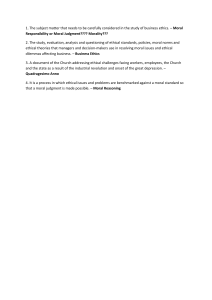
Ethics: Principles of Ethical Behavior in Modern Society INTRODUCTION: Key Concepts in Ethics ETHICS THE IMPORTANCE OF RULES TO SOCIAL BEINGS -Branch of philosophy concerned with morality or the rightness or wrongness of human behavior. • - Derived from the Greek word, “ethos” means character, or in plural, ‘manners’ • MORALITY -Speaks of a code or system of behavior in regards to standards of right or wrong behavior. • Regulations or principles that serve to govern conduct within a specific activity or sphere. Gives us a clear meaning of what is or not allowed in a particular context or situation. Without them, anarchy would likely ensue. RULES BENEFIT SOCIAL BEINGS IN VARIOUS MANNERS: HOW TO DEFINE GOOD/ RIGHT? GOOD: A. RU1. RULES PROTECT SOCIAL BEINGS BY RIGHT: - Beneficial to - in compliance REGULATING BEHAVIOR everybody -Boundaries and limits to certain with laws - Achievement of behaviors. Failure to follow such and rules goal boundaries mean consequences. TYPES OF GOOD: TYPES OF - Some people are abusive to rules RIGHT: - This allows limitations to be set on one's INSTRUMENTAL NON-MORAL behavior GOOD RIGHT - EX: Atty. Gaddon suspended by - email for chatting. - if you answer supreme court due to aggressive Uses an instrument recitation. It bullying behavior towards a reporter to do good does not - Used for our benefit comply with rules B. 2. RULES HELP GUARANTEE EACH BIOLOGICAL - 1+1 = 2 PERSON CERTAIN RIGHTS AND GOOD - It is right but FREEDOM - Food, water, and not in -Forms the frameworks of society through a air. Satisfies accordance with nation's constitution. Such rules are created biological needs of any rules to guarantee individuals rights and individual freedoms, as well as protection from - Used for our needs MORALLY unchecked power by the government. RIGHT e.g., 1987 Constitution THEOLOGICAL - according -All based on code of standard or Law - No longer good, if it to moral doesn’t serve its principles. 3. RULES PRODUCE A SENSE OF function/purpose/goal - If you pick up a wallet, and JUSTICE AMONG SOCIAL BEINGS return it -Rules on division of power and check and - Walking in balances prevents the centralization of pedestrian power to a single government entity. lane Transcriber: Sarah B. Taguinod Reference: De Guzman, J. M, et al. (2017). Ethics: principles of ethical behavior in modern society. Malabon City : Mutya Publishing House, Inc. 20 February, 2022: Revision 1 Ethics: Principles of Ethical Behavior in Modern Society INTRODUCTION: Key Concepts in Ethics -Check and Balance e.g. - Police shot down a man in front of the daughter. Conditioned people to feel powerless - nder authority. But it is not right, equal rights despite power given to you. 4. RULES ARE ESSENTIAL FOR A HEALTHY ECONOMIC SYSTEM - Without the regulation of such economic systems, monopolies would have the power to make the system favor themselves. - Protect consumer and manufacturers - Follow law of supply and demand - Make sure to protect all human beings equally MORAL STANDARDS VS NONMORAL STANDARDS MORAL NON-MORAL STANDARDS STANDARDS -Involve the moral - Rules that principles that have individuals have nothing to do regarding the kind with moral or of behaviors they feel ethical issues. are ethically right and - Rules of wrong. etiquette, fashion standards, rules in games and house rules Not all rules are moral rules. That is, not all standards are moral standards. Morality refers to the set of standards that enable people to live cooperatively in groups. It’s what societies determine to be “right” and “acceptable.” Sometimes, acting in a moral manner means individuals must sacrifice their own short-term interests to benefit society (Morin, 2020). CHARACTERISTICS OF MORAL STANDARDS 1. MORAL STANDARDS INVOLVE SERIOUS WRONGS OR SIGNIFICANT BENEFITS. -Moral standards deal with matters which can seriously impact, that is, injure or benefit human beings. It is not the case with many non-related standards. - Some sports have rules necessary for game, NOT a moral standard 2. MORAL STANDARDS OUGHT TO BE PREFERRED TO OTHER VALUES. -Moral standards have overriding character or hegemonic authority. If a moral standard states that a person has the moral obligation to do something, then he/she is supposed to do that even if it conflicts with other non-moral standards, and even with self interest - Telling a lie to save dignity, is morally wrong - Lying to protect someone is still MORALLY WRONG, according to law 3. MORAL STANDARDS ARE NOT ESTABLISHED BY AUTHORITY FIGURES. -Moral standards are not invented, formed, or generated by authoritative bodies or persons such as nations' legislative bodies. Moral standards cannot be changed or nullified by the decisions of particular authoritative body. Transcriber: Sarah B. Taguinod Reference: De Guzman, J. M, et al. (2017). Ethics: principles of ethical behavior in modern society. Malabon City : Mutya Publishing House, Inc. 20 February, 2022: Revision 1 Ethics: Principles of Ethical Behavior in Modern Society INTRODUCTION: Key Concepts in Ethics - Cannot be nullified by someone event hose with power proposed for use, to advise, and to influence to action. - Considered in process of making a law - To help in evaluate behavior 4. MORAL STANDARDS HAVE THE TRAIT OF UNIVERSALIZABILITY. - Praise good behavior -Simply, put it means that everyone should live up to moral standards. To be more accurate, however, it entails those moral principles must apply to all who are in the relevantly similar situation. - Person should be consistent and live up to moral standards - Not allowed to be changed by authority, but processed from bill, approved, then studied before law is passed 5. MORAL STANDARDS ARE BASED ON IMPARTIAL CONSIDERATIONS. -Moral standards do not evaluate standards on the basis of the interests of a certain person or group, but one that goes beyond personal interests to a universal standpoint in which each person's interests are impartially counted as equal. - Should not be biased, specific to an interest of one person, but should be towards all 6. MORAL STANDARDS ARE ASSOCIATED WITH SPECIAL EMOTIONS AND VOCABULARY. -Prescriptivity indicates the practical or action-guiding nature of moral standards. These moral standards are genetically put forth as injunction or imperatives. These principles are - Guilt someone if it is bad DILEMMA AND MORAL DILEMMA DILEMMA- refers to a situation in which a tough choice has to be made between two or more options, especially more or less equally undesirable ones. MORAL DILEMMA- a situation where a difficult choice has to be made between two courses of action, either of which entails transgressing a moral principle -Also known as ethical dilemma GREEK PHILOSOPHER "MORAL DILEMMA" " Return a borrowed weapon to a friend who is not in his right mind." CEPHALUS - “justice" as speaking the truth and paying one's debts. SOCRATES - two moral norms: repaying one's debts and protecting others from harm "Some ethicists propose that when one of the conflicting moral requirements overrides the other, the case is not a "genuine moral dilemma.'' THE KEY FEATURES OF A MORAL DILEMMA -The agent is required to do each of two (or more) actions; - the agent can do each of the actions; but the agent cannot do both (or all) of the actions. Transcriber: Sarah B. Taguinod Reference: De Guzman, J. M, et al. (2017). Ethics: principles of ethical behavior in modern society. Malabon City : Mutya Publishing House, Inc. 20 February, 2022: Revision 1 Ethics: Principles of Ethical Behavior in Modern Society INTRODUCTION: Key Concepts in Ethics -neither of the conflicting moral requirements is overridden. THREE LEVEL OF MORAL DILEMMAS PERSONAL DILEMMAS - are those experienced and resolved on the personal level. -Situations in which the decision-maker must consider two or more moral values or duties but can only honor one of them 1. you are the only one involved 2. Teacher-student relationship 3. Some think it is wrong; can’t lose job or will get judgement from others ORGANIZATIONAL DILEMMAS -ethical situations encountered and resolved by social organizations. - decision made for an entire organization and not only in personal level STRUCTURAL DILEMMAS -refer to cases involving networks of institutions and operative theoretical paradigms ONLY HUMAN BEINGS CAN BE ETHICAL A belief that only human beings can be truly ethical 1. Only human beings are rational, autonomous, and self-conscious. The qualities of rationality, autonomy, and self-consciousness are believed to confer a full and equal moral status to those that possess them. 2. Only human being can act morally or immorally. -Animals which devours other animals cannot to be immoral -Only beings that can act morally can be required to sacrifice their interest for the sake of others. 3. Only human beings are part of the moral community - The so-called moral community is defined in terms of the essential social relations that exist between or among beings - Only human beings can practice values such as love, honor, social relationships, forgiveness, compassion, and altruism. FREEDOM AS A FOUNDATION OF MORALITY -Only Human Beings can be ethical (animals cannot act morally) • rational, autonomous, and selfconscious • can act morally or immorally • part of the moral community morality is based on freedom and choice -morality is a question of choice -morality requires and allows choice -everyone who wishes to function morally and rationally in a society has to make choices virtually every minute of the day MINIMUM REQUIREMENT FOR MORALITY: REASON AND IMPARTIALITY 1. Reason as a requirement for morality entails those human feelings be important in ethical decisions, but they Transcriber: Sarah B. Taguinod Reference: De Guzman, J. M, et al. (2017). Ethics: principles of ethical behavior in modern society. Malabon City : Mutya Publishing House, Inc. 20 February, 2022: Revision 1 Ethics: Principles of Ethical Behavior in Modern Society INTRODUCTION: Key Concepts in Ethics ought to be guided by reason. Sound reasoning helps us to evaluate whether our feelings and intuitions about moral cases. 2. Impartiality, on the other hand, involves the idea that each individual's interests and point of view are equally important. Also called evenhandedness or fair-mindedness, impartiality is a principle of justice holding decisions ought to be based on objective criteria, rather than on the basis of bias, prejudice, or preferring the benefit to one person over another for improper reasons. Ethical dilemmas also arise even in professional work. Ans: true 7. Ethical Dilemmas also arise even in professional work Ans. True 7. Structural moral dilemmas refer to cases involving network or institutions and operative theoretical paradigms Ans. True NOTE: sagot ko lamang po itu hehez QUIZ 1 1. Moral Standard are needed in order to keep the strong from dominating the weak. Ans: False 2. Rules can’t tell us what is or is not allowed in a particular context or situation Ans: false 3. Rules deals with matters which can seriously impact, that is, injure or benefit human beings. Ans: false 4. Moral standard evaluates standards on of the interest s of a certain person or group, but one goes beyond personal interest. Ans: false 5. Organization moral dilemmas refers to ethical cases encountered and resolved by social organization. Ans: true Transcriber: Sarah B. Taguinod Reference: De Guzman, J. M, et al. (2017). Ethics: principles of ethical behavior in modern society. Malabon City : Mutya Publishing House, Inc. 20 February, 2022: Revision 1




